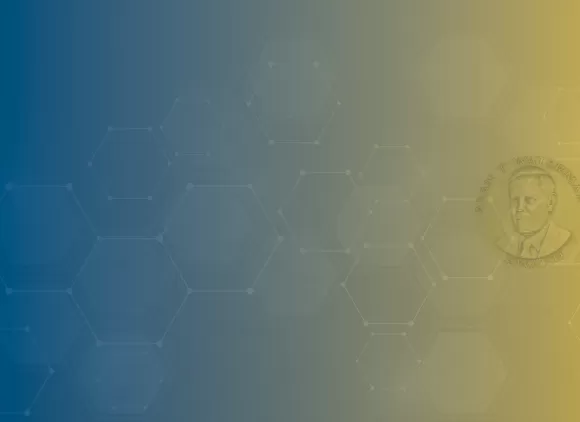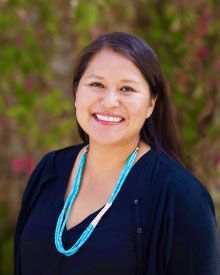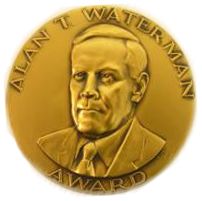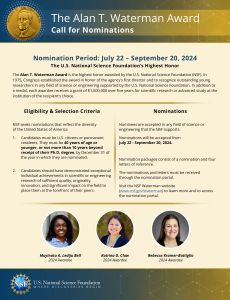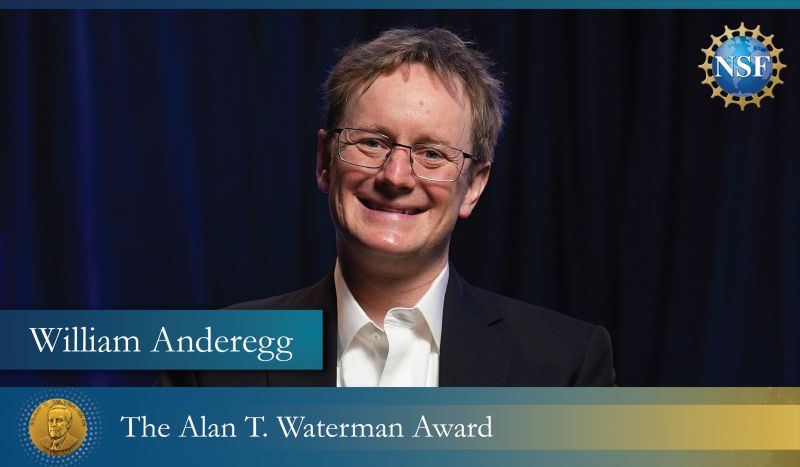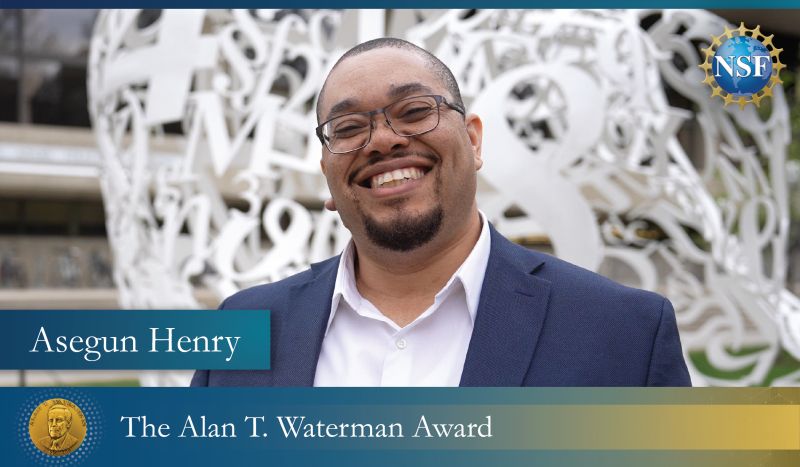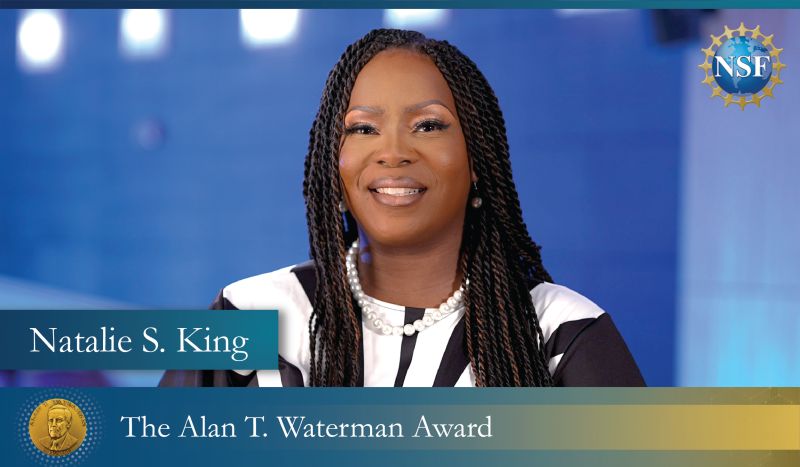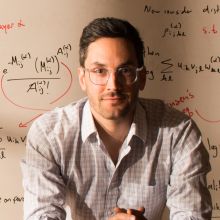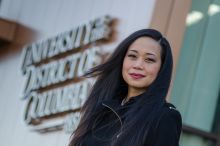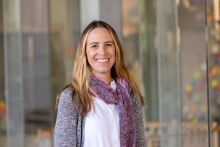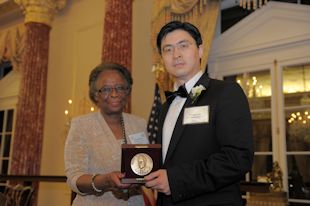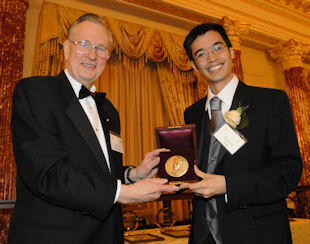News
NSF honors 3 outstanding early-career researchers with the Alan T. Waterman Award
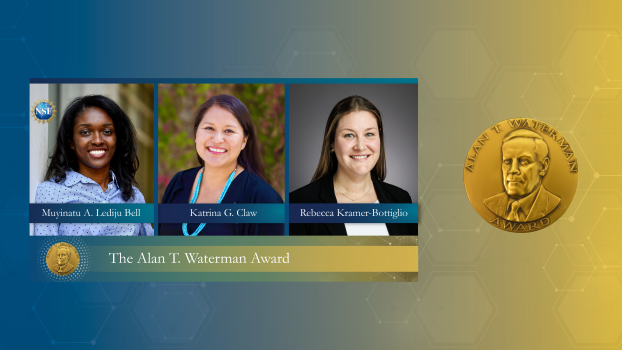
Credit: U.S. National Science Foundation
The U.S. National Science Foundation honored three researchers with the Alan T. Waterman Award, the nation's highest honor for early-career scientists and engineers.
The 2024 recipients: Muyinatu A. Lediju Bell, a biomedical engineer at Johns Hopkins University; Katrina G. Claw, a genetic scientist at the University of Colorado Anschutz Medical Campus; and Rebecca Kramer-Bottiglio, an engineer working in robotics at Yale University, were recognized for their innovative approaches and leadership in their respective fields and for pushing the boundaries of science in truly novel ways.
The Waterman Award will be presented to the recipients at a ceremony during the National Science Board meeting, which will be held in Washington, D.C., on May 1. In addition to a medal, awardees will each receive $1 million over five years for research in their chosen field of science.
"These three outstanding researchers exhibit extraordinary scientific research accomplishments and stand out as leaders among their peers," said NSF Director Sethuraman Panchanathan. "This award recognizes their contributions and is also a vital investment in the future of science discovery and innovation, empowering the awardees to deepen their research, expand their projects, and explore new frontiers in their field. More importantly, it enables these exceptional individuals to apply their groundbreaking work for the betterment of their communities and society at large."
Muyinatu A. Lediju Bell
Johns Hopkins University
Muyinatu Bell knew at age 6 that she wanted to be a scientist. Among her earliest influences were the residents of Sesame Street, who captured her imagination by conducting "interesting experiments with colorful test tubes."
Inspired by those memories and guided by her mother and older brother, Bell is now a pioneering biomedical engineer, working in the intersection of physics, electrical and computer engineering, biomedical engineering and computer science. She has developed groundbreaking techniques that are transforming the utility of medical imaging, especially in ultrasound and photoacoustic imaging, by harnessing the power of light and sound to improve diagnostic capabilities and guide surgeries.
"My inspiration is drawn from a desire to improve disease detection, to deliver the earliest possible detection strategies as the best path to successful treatment plans, and to facilitate treatment plans that ensure the safest possible outcomes, particularly when surgery is involved," she said.
Bell, an associate professor at Johns Hopkins University, is best known for inventing the short-lag spatial coherence (SLSC) ultrasound beamformer, which significantly improves ultrasound image quality by reducing acoustic clutter. This invention motivated the development and refinement of the generalized contrast-to-noise ratio, a widely used metric that sets a new standard for image quality assessments. Bell has also adapted the SLSC technology to photoacoustic imaging, most recently using it to overcome problems related to skin tone bias in which melanin affects how deeply light can penetrate in photoacoustic imaging and is also responsible for generating acoustic clutter that obscures structures of interest. This technique developed by Bell benefits multiple communities, including patients with darker skin tones, women with dense breast tissue, and overweight or obese patients.
"I learned that acoustic clutter is one of the most common and detrimental ultrasound imaging artifacts," she said. "My breakthrough came when I was the first to realize that I can integrate spatial coherence functions, which contain characteristic differences between real tissue signals and acoustic clutter, and thereby deliver visual images of these differences. This visual display of the distinct differences offers improved image quality for patients underserved by ultrasound technology due to the presence of acoustic clutter. The same underlying principle applies to photoacoustic images."
Bell is a lecturer, mentor and scientific role model committed to engaging a diverse research community by serving in leadership roles on committees and programs aimed at supporting women in physics, computer science and engineering. She is the recipient of NSF awards from the Faculty Early Career Development (CAREER) program and the Smart Health program.
The NSF CAREER award "helped to give me the confidence that I am right where I belong, living my childhood dream, and with the award, I knew I would have resources to thrive as a scientist, at least for the next five years," Bell said. "I pursued many of the bold and creative ideas I proposed. I received supplements to mentor undergraduate students. My team grew and expanded. My students and collaborators contributed new and fresh perspectives and ideas. It was an amazing accomplishment and success that seeded, bred and fertilized more success. NSF support has been very instrumental to the progression of my career as a scientist and engineer."
The Waterman Award will assist Bell in expanding her current work in new directions and pursuing other avenues, she said. "I can now purchase new equipment to start a new line of research, hire the support and administrative staff that I need as I grow my lab, hire research scientists who will help me to expand new research opportunities, hire dedicated personnel to assist with multiple tech ventures originating from my lab. The possibilities are endless."
Waterman Awardee Distinguished Lecture: Equitable Medical Imaging by Muyinatu Bell
Wednesday, August 21, 2024
11:30 a.m. – 12:30 p.m.
Register in advance for this webinar
Katrina G. Claw
University of Colorado Anschutz Medical Campus
Growing up in the Navajo Nation, Katrina Claw did not know what "scientific research" meant or that it could be a career. But she understood that practices like dry farming or herbal remedies used by her family were rooted in long-established methods refined over centuries and passed down through multiple generations.
"This was the science — Indigenous Science and Traditional Knowledge — that I grew up with and are fundamental to my worldviews today," she said. "The interconnectedness of all living and non-living entities and balance are concepts that I learned as a child, and these are still concepts at the core of my research program."
Claw is a genomic scientist and leader in Indigenous science, recognized for her contributions to pharmacogenomics and for fostering cultural and bioethical research participation within Indigenous communities. As a member of the Navajo Nation, she is dedicated to collaborative and community-based genetic research that produces better science and ethically benefits all participants.
As a co-principal investigator and a past predoctoral fellow, Claw received an NSF award from the Directorate for Social, Behavioral and Economic Sciences' Office of Multidisciplinary Activities in the Ethical and Responsible Research (ER2) program. Her project aligns with a key aim of the ER2 program, which is to foster ethical and responsible practice in science, technology, engineering and mathematics research communities. Her research program supports equity and inclusion of diverse populations in pharmacogenomic research and personalized medicine, addresses disparities in health and health care, and enhances ethical research with participation from American Indian, Alaska Native and other historically marginalized communities. She has established research partnerships with multiple American Indian, Alaskan Native and First Nations tribal communities.
Claw is an assistant professor in the Department of Biomedical Informatics at the University of Colorado School of Medicine, and her genomic research is at the forefront of disease treatment and prevention. She has demonstrated strong associations between nicotine metabolism and CYP2A6 gene variation in a tribally diverse Indigenous population. Claw's research further demonstrated substantial diversity in the versions of the CYP2A6 gene, which is strongly associated with nicotine metabolism, among Indigenous communities from different tribes and geographic regions. These findings suggest that diverse groups may benefit from personalized tobacco cessation treatment, guided in part by unique genetics.
"The foundation of my work is community-based participatory research, and I strive to use a culturally responsive and adaptive ethical framework that respects the principles of data sovereignty and tribal oversight," Claw said. "My overall goal is to show that community-engaged genomics research can bring about meaningful and impactful change in Indigenous communities. My research program studies pharmacogenomic variation and the cultural, ethical, legal and social implications (CELSI) of genomic research with Indigenous peoples. The past is inextricably linked to the present and the future, and the history of Native communities naturally extends my research into the ethical and social realms. Thus, my research projects involve both contemporary Indigenous peoples and Ancestors of the past."
Claw is a committed leader, mentor and contributor to national policy discussions for Indigenous communities, especially related to genetics. She is funded by the Native American Research Center for Health initiative to create a glossary of genetic terms and digital stories in Navajo. "Being awarded made me acutely aware of how my research interests and desire to work with Native communities was important, needed, and how few people from my tribal community were in the position to apply for these opportunities."
Claw is the first Waterman recipient from the Navajo Nation. "I hope that it will inspire some other young ch'ízhii budding scientists entering their first science fair competition, and I hope that my story will help others believe in themselves and move forward in careers in STEM. With the award, I'm excited to fund the community engagement and tribal capacity-building work that are so important to the future of Native peoples in science."
Waterman Awardee Distinguished Lecture: Katrina Claw
Wednesday, September 4, 2024
11:00 a.m. – 12:00 p.m.
Register in advance for this lecture
Rebecca Kramer-Bottiglio
Yale University
Rebecca Kramer-Bottiglio has "always been drawn to math and prototyping, and the thrill of uncovering how things work," she said. "Engineering seamlessly integrates these passions."
Her multidisciplinary research approach incorporates materials science, robotics, artificial intelligence, biology and art. Her breakthrough design strategy of adaptive morphogenesis for robotics is inspired by biological adaptations, morphogenesis and evolution and extends techniques she developed to create shape-shifting and phase-changing materials. When integrated into robots, these new materials enable transformative new capabilities via unprecedented adaptive behaviors.
"Robots are traditionally mechanical assemblies designed to complete a single task in a specific context. In contrast, biological organisms adapt physiologically, behaviorally and morphologically in response to changing environmental conditions," Kramer-Bottiglio said. "My research focuses on imbuing next-generation robots with the ability to adapt and evolve like animals. I study multifunctional materials and their utility in soft-material robots capable of evolving their physical structure and corresponding behavior as they encounter new task demands or environments."
Kramer-Bottiglio developed an amphibious turtle-inspired robot with limbs made from coupled fluidic actuators and variable-stiffness materials that change between hydrodynamic flippers and load-bearing leg shapes depending on the environment. Adapting both the form and function of the robot enabled efficient movement both in water and on land, yielding energetic savings for multi-environment locomotion. With this morphing robot platform, she proved that morphological adaptation is a favorable strategy to expand the future capabilities of robots while simultaneously reducing the energy requirements to do so.
"Breaking through my own conception of what a robot is helped me realize their potential," she said. "If we discard the notion that robots must be mechanical assemblies of discrete components and instead consider them as material systems with multifunctionalities, we gain access to a host of new materials, techniques and tools that can be used to create the next generation of robots."
Kramer-Bottiglio is a mentor dedicated to broadening participation in STEM research. She is the recipient of awards from the NSF CAREER, Designing Materials to Revolutionize and Engineer our Future, Emerging Frontiers in Research and Innovation, Human-Centered Computing, and Innovative Technology Experiences for Students and Teachers programs.
"NSF has been incredibly important throughout my career, supporting my research in areas such as materials processing, soft robotics and engineering education," she said. "For instance, one NSF award supported a collaborative research project to test the hypothesis that the implementation of soft robot design experiences improves students' engineering self-efficacy and interest in engineering careers as compared to traditional robot design experiences. Through a partnership with experts in engineering education, we found evidence to support this claim. The research resulted in a new engineering design curriculum that has been sustainably integrated into an upper high school course with national dissemination. I am unsure that I would have been able to pursue such an interdisciplinary project without the support of the NSF."
The Waterman Award will enable Kramer-Bottiglio "to pursue interdisciplinary and high-risk research directions that hold the potential to unlock new capabilities for robots, enabling them to evolve on demand in response to changing tasks or environments," she said. "Robots that can evolve on demand provide a platform to study physical evolution-based optimization. How and when should a robot adapt its shape when switching between tasks or environments? What are the optimal shapes for specific tasks and environments? Can we use synthetic evolution to discover adaptation strategies that animals might use to adapt to our changing environment? Can the use of living materials in robots increase their adaptive capabilities? I hope to find out."
Waterman Awardee Distinguished Lecture: Robots that Evolve on Demand by Rebecca Kramer-Bottiglio
Wednesday, September 25, 2024
1:00 p.m. – 2:00 p.m.
Register in advance for this lecture
Overview
The Alan T. Waterman Award recognizes an outstanding young researcher in any field of science or engineering supported by the U.S. National Science Foundation.
The annual award is the nation's highest honor for early-career scientists and engineers. In addition to a medal, the awardee receives a grant of $1,000,000 over a five-year period for scientific research or advanced study in the science and engineering disciplines supported by the National Science Foundation at the institution of their choice. Disciplines supported by the NSF include the biological sciences, computer and information science and engineering, engineering, geosciences, mathematical and physical sciences, social, behavioral and economic sciences, and research on STEM education.
Congress established the award in August 1975 to mark NSF's 25th anniversary and to honor the agency's first director.
Nomination information
NSF seeks nominations for exceptional candidates that represent the diversity of the nation.
Nominations for the 2025 Alan T. Waterman award will be accepted from July 22 to September 20, 2024. If you would like to plan a nomination, please review the Nomination form description, Letter of reference template, and Nominations tips to help you prepare a nomination.
The Nomination tips were created by the Alan T. Waterman Awards Committee to support nominators and reference writers in their efforts to expertly showcase the talents and expertise of nominees.
Additional information can be found in the Frequently asked questions.
Eligibility and selection criteria
NSF seeks nominations that reflect the diversity of the U.S.
- Nominees must:
- Be U.S. citizens or permanent residents.
- Be 40 years of age or younger OR not be more than 10 years beyond receipt of their Ph.D. by December 31st of the year they are nominated.
- Nominees should have demonstrated exceptional individual achievements in scientific or engineering research of sufficient quality, originality, innovation and significant impact on the field to place them at the forefront of their peers.
Videos and lectures
Additional videos
Alan T. Waterman award committee
Candidates are reviewed by the Alan T. Waterman Award committee once the nomination call has closed. The committee then recommends the most outstanding candidate(s) to NSF's director and the National Science Board.
Terms expire May 31, 2025
Ana de Bettencourt-Dias
Susan Magee and Gary Clemons Professor of Chemistry, Foundation Professor
University of Nevada, Reno
Biography
Ann Quiroz Gates
AT&T Distinguished Professor, Computer Science
University of Texas - El Paso
Biography
Gary Hoover
Professor, Executive Director of the Murphy Institute
Tulane University
Biography
Margaret Leinen
Director, Scripps Institution of Oceangraphy
University of California, San Diego
Biography
William Simpson
Professor, Department of Chemistry and Biochemistry
University of Alaska Fairbanks
Biography
Darryl N. Williams
Senior Vice President, Science and Education
The Franklin Institute
Biography
Terms expire May 31, 2026
Dr. Susan Kalisz
Research Professor
University of Tennessee
Biography
Dr. Surya Mallapragada
Associate Vice President for Research
Iowa State University
Biography
Dr. Mary Jo Ondrechen
Professor
Northeastern University
Biography
Dr. Lance C. Pérez
Dean, College of Engineering
Omar H. Heins Professor of Electrical and Computer Engineering
University of Nebraska, Lincoln
Biography
Dr. Enrico Ramirez-Ruiz
Professor
University of California, Santa Cruz
Biography
Terms expire May 31, 2027
Arthur Lupia
Institute for Social Research (ISR)
University of Michigan
Biography
Juan S. Ramírez Lugo
Associate Professor
University of Puerto Rico, Rio Piedras
Biography
Tonya L. Smith-Jackson
North Carolina Agricultural and Technical State University
Biography
Yes. The criteria state that the nominee must be 40 years of age or younger by December 31st of the year of nomination OR within 10 years of receiving their Ph.D. by December 31st of the year of nomination.
A complete nomination includes submission of all requested information through the nomination portal and submission of all four references. The four references must be from individuals who are not from the nominee's home institution. Incomplete nominations will not be reviewed by the committee.
Yes. Please submit no more than the four required reference letters. NSF will not review more than four letters per nomination. Reference letters are limited to two pages each.
Reference letters are welcome from colleagues outside the nominee's home institution. Colleagues at the nominee's institution may not submit reference letters for the nominee.
Yes. You may nominate as many qualified candidates as you would like.
No. Self-nominations are not accepted.
No, the person that enters the nomination cannot also be the nominee. This would be considered a self nomination and self nominations are not allowed.
Because the award includes an extramural federal grant, federal employees are not eligible to be nominees.
Yes. The nominator can be from the nominee’s home institution or another institution.
The nominee can be informed that they are being nominated. Involving the nominee in a conversation around your intention to nominate them may help strengthen the nomination by providing additional insights into their work and suggestions for letter writers.
In general, nominations do not carry over. They will be removed from the portal at the end of the review cycle. Each year, a small number of nominees are shortlisted by the ATW Committee as “top performers”. Nominators of top performers are notified near the time when the nomination portal opens for the following year, so that they have an opportunity to update the nomination, should they wish to do so.
Graduate advisors can be nominators or letter writers (provided that the letter writer is not at the same institution as the nominee). Keep in mind that someone may be nominated up to 10 years after their doctoral degree. It is important to have a nominator and/or letter writers that can speak to the nominee’s professional experience. The contributors to the nomination should have relevant leadership experience in the nominee’s field of research to convey the importance, impact, and context of the nominee’s work within and across their disciplinary fields.
Yes. Letter writers can be from foreign institutions. However, the letters must be written in English.
National Science Foundation staff should not submit nominations or letters of reference.
Past recipients
Inquiries
For further information concerning the Alan T. Waterman Award program or nomination process, email waterman@nsf.gov or contact NSF's Office of Integrative Activities at (703) 292-8040.

